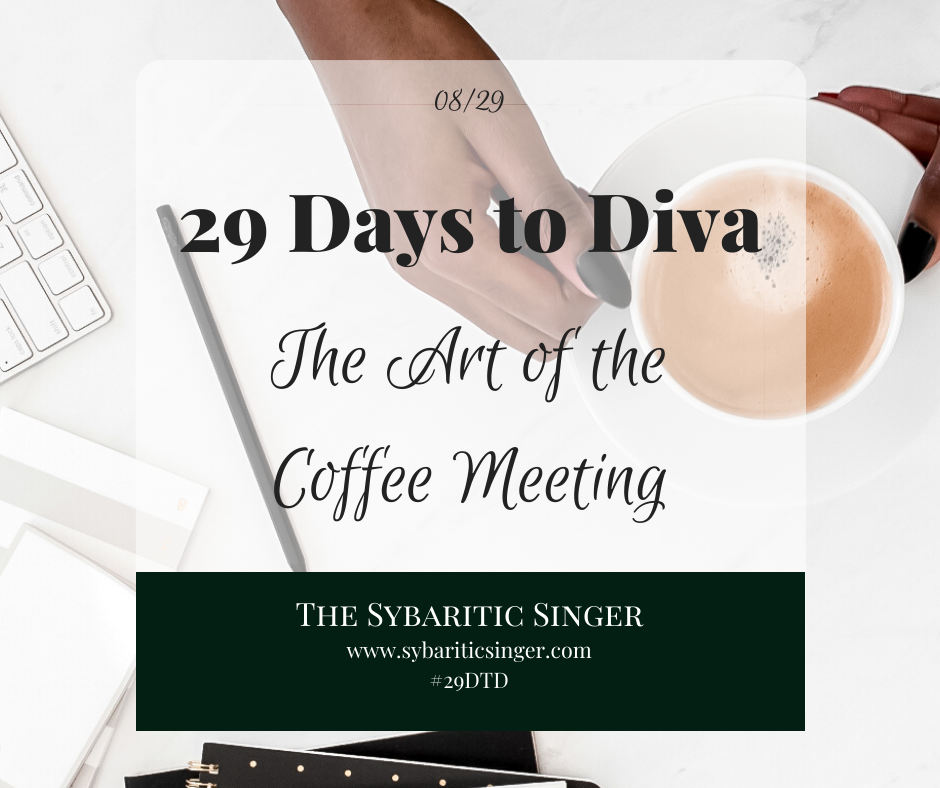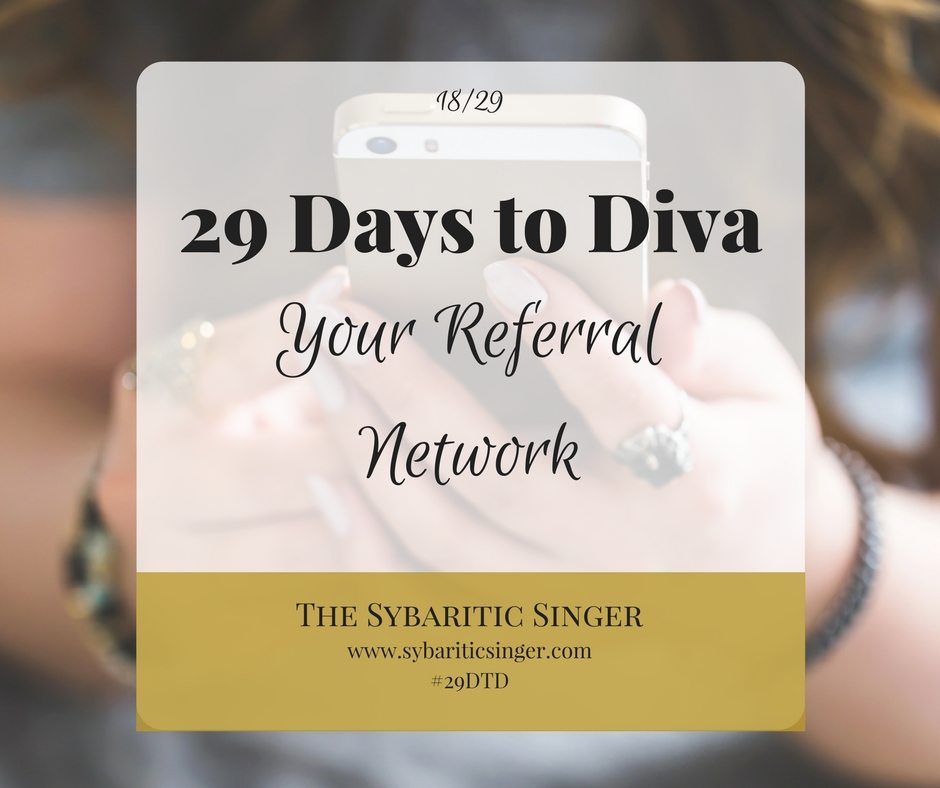Oh divas, I’ve got a treat for you today. We’re learning from another diva mentor and this one is spectacular. Today’s assignment comes from the remarkable musician, organizer, and advocate Amanda DeBoer Bartlett. She is an Omaha-based musician/artist who specializes in the work of living composers. Along with her solo repertoire, she is a member of Ensemble Dal Niente, Hasco Duo and Quince Contemporary Vocal Ensemble. She is also the founder and director of an experimental performance festival called Omaha Under the Radar. Suffice to say, Amanda is one of my favorite examples of someone who is actively constructing the musical world in which they want to live.
I asked Amanda to share some of her hard-won wisdom on a critical soft skill in her career. It didn’t surprise me at all to read her answer: The art of the coffee meeting! She said, “Meeting with my community, especially people outside of music, has created a network of thought-leaders that I rely on to build my career as an organizer and artist.”
[Like the images that you see in the 29 Days to Diva series? From lifestyle images to laptop mockups to boho desktops, Haute Stock offers a wide variety of sleek and modern collections.]
29 Days to Diva Day 8 Assignment: Schedule a Coffee Meeting
If having your 5 aria package is an audition standard with which you’re familiar, think of this as the networking standard. Being able to engage in a low-risk way to meet new people, learn about their interests, and lay the foundation for a deeper bond is one of the best soft skills you can develop in your professionally creative life.
There is one incredible important, guiding principle for the coffee meeting: never, ever waste the other person’s time. If you have the desire to meet with someone, it’s likely because they do cool and inspiring things. It is a fundamental fact that people who do cool and inspiring things don’t get that way because they have an abundance of free time to waste.
Coffee Meeting Basics
Here are some important steps when you’re asking someone to schedule a coffee meeting with you:
- Be clear in the asking.
- Introduce yourself (Note: this works even better if you’ve already developed a baseline name recognition with that person through social media or local events.), show that you have specific knowledge of their work, offer why you’d like to talk, and propose potential times.
- Do your homework.
-
If you ask for a coffee/meeting/dinner with a composer and show up not even having listened to one of their pieces, you should feel like an asshole.
Meanwhile, I guarantee you I will show up every time knowing your bio, your work, and who your sister took to prom in 1998
— Stephanie Ann Boyd (@stephaniannboyd) February 6, 2020
-
- Respect their time and their earned wisdom and experience.
- Do not be late. End on time.
- Offer to pay. It was your idea to meet and grab coffee, it’s only fair that you cover the costs. If you can’t pay, think about ways in which you could meet up without having to include a monetary transaction.
- Remember what they say.
- This is an addition to “respect the other person.” I want to draw specific attention to the fact that you can show respect by remembering what people tell you. If you need to take notes somehow, figure out how to do it and make it smooth as hell.
- “Coffee Meetings” can be a lot of different activities.
- If it makes more sense to ask someone to meet you at a concert, go for it. Or, you can always make a plan to grab a beverage (of any kind) after a performance. Be creative; don’t be creepy.
Those are some basic steps to make sure you’re bringing your A Game to any coffee meeting situation. There’s a deeper reason I want you to schedule a coffee meeting though. That reason is community building. As human beings, we need a sense of belonging, and that sense of belonging is what connects us to the many relationships we develop. Being proactive about community building makes you happier, provides a necessary feeling of belonging for yourself and others, and strengthens your field/region’s success.
Your Community is Much Larger Than “Classical Music”
Please notice that I’m using “field” and “region” here on purpose. Thinking of your community as much larger than “classical music” or “new music” is crucial. Amanda says it really well here:
I’d say the number one leveling up skill I’ve utilized is community building outside music, or within music but in genres I’m not involved in. We can’t rely on other contemporary classical musicians to buoy our careers. It’s not sustainable or interesting. I schedule phone calls and coffee meet ups every week to learn about what folks in Omaha and around the country are up to. I specifically seek out folks from the jazz and rock scenes, young politicians, small business owners, poets, dancers, and visual artists. I want to know how individuals are adjusting to new thoughts and technologies in their industries, and how they’ve managed to carve out a space for themselves in their cities and professional environments. Plus, it’s nice to have folks coming to shows from outside my little microcosm of experimental music.
Classical music and contemporary classical music are OBSESSED with community and audience building (especially the coveted “young audience.”), and there are endless marketing schemes devised to “reach” this magical, new audience. From my view, though, there’s no shortcut. None of us are going to trick people into coming to our shows. My method is slow and steady, one person at a time (and maybe their cool friends!)
Take Amanda’s advice to heart and build your community one person at a time. That is your assignment for today.
How Can I Answer Your Questions?
So divas, what would make this clearer or easier to accomplish? What part of setting up coffee meetings makes you feel stalled or stuck? Let’s talk about it. You can drop me a line in the comments below. Or, feel free to connect with me on social media. I’m @mezzoihnen and I love to hear from you. Being able to talk about your specific situation is a part of this journey that I enjoy wholeheartedly.
Did you like this post?
I think you’re gonna love this one too:
“Boom. Referral network.” Our diva gave her cousin one of those little side-eye smirks. Her cousin went on, “Hear me out, the whole point of networking is so that you are the first person that people think of when they have a particular issue. ‘I have an opening on our performance calendar. What should I do?’” her cousin mockingly wailed. “They need to call you. But, if they don’t know to think about you, they’re gonna call someone else.”



